Filter by

Harnessing public research for innovation in the 21st century: an internation…
Universities and public research institutes play a key role in the innovation ecosystem. Many countries have implemented national strategies to support the commercialization of knowledge produced by public institutions, to help take their innovations and scientific breakthroughs to market and ultimately boost economic growth. Research bodies themselves have also introduced practices to support …
- Edition
- -
- ISBN/ISSN
- 9781108842792
- Collation
- 544 p
- Series Title
- Intellectual property, innovation and economic development
- Call Number
- 607.2 ARU h
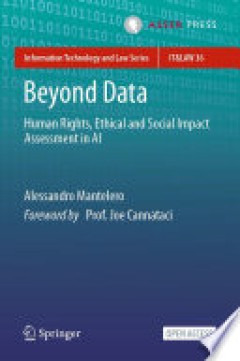
Beyond data : human rights, ethical and social impact assessment in AI
This open access book focuses on the impact of Artificial Intelligence (AI) on individuals and society from a legal perspective, providing a comprehensive risk-based methodological framework to address it. Building on the limitations of data protection in dealing with the challenges of AI, the author proposes an integrated approach to risk assessment that focuses on human rights and encompasses…
- Edition
- Ed. 1
- ISBN/ISSN
- 9789462655317
- Collation
- XXIII, 200
- Series Title
- -
- Call Number
- 343.0999 Man b

Academic brands : distinction in global higher education
The first comprehensive analysis of the emergence of academic brands, this book explores how the modern university is being transformed in an increasingly global economy of higher education where luxury is replacing access. More than just a sign of corporatization and privatization, academic brands provide a unique window on the university's concerns and struggles with conveying 'excellence' an…
- Edition
- -
- ISBN/ISSN
- 9781108881920
- Collation
- xiii, 220p. ; ill.
- Series Title
- -
- Call Number
- 378.101 ACA e

Cybersecurity in Poland
This open access book explores the legal aspects of cybersecurity in Poland. The authors are not limited to the framework created by the NCSA (National Cybersecurity System Act – this act was the first attempt to create a legal regulation of cybersecurity and, in addition, has implemented the provisions of the NIS Directive) but may discuss a number of other issues. The book presents internat…
- Edition
- -
- ISBN/ISSN
- 9783030785512
- Collation
- xvi; 513 PG; ill.
- Series Title
- -
- Call Number
- 343.099 CYB c
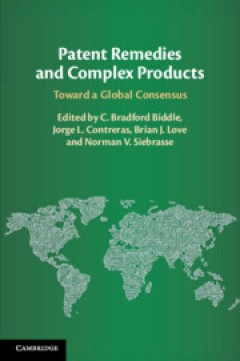
Patent Remedies and Complex Products : Toward a Global Consensus
Through a collaboration among twenty legal scholars from eleven countries in North America, Europe and Asia, Patent Remedies and Complex Products presents an international consensus on the use of patent remedies for complex products such as smartphones, computer networks and the Internet of Things. It covers the application of both monetary remedies like reasonable royalties, lost profits, and …
- Edition
- -
- ISBN/ISSN
- 9781108594981
- Collation
- xxvi, 380 p : ill
- Series Title
- -
- Call Number
- 346.0486 PAT C

Medieval Hackers
Medieval Hackers calls attention to the use of certain vocabulary terms in the Middle Ages and today: commonness, openness, and freedom. Today we associate this language with computer hackers, some of whom believe that information, from literature to the code that makes up computer programs, should be much more accessible to the general public than it is. In the medieval past these same terms w…
- Edition
- -
- ISBN/ISSN
- 9780692352465
- Collation
- ScholarLed
- Series Title
- -
- Call Number
- -
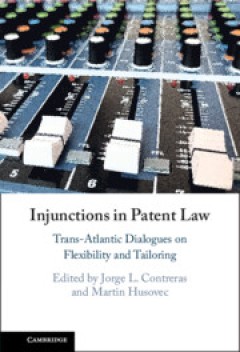
Injunctions in patent law : Trans-Atlantic dialogues on flexibility and tailo…
Patents are important tools for innovation policy. They incentivize the creation and dissemination of new technical solutions and help to disclose their working to the public in exchange for limited exclusivity. Injunctions are important tools of their enforcement. Much has been written about different aspects of the patent system, but the issue of injunctions is largely neglected in the compar…
- Edition
- -
- ISBN/ISSN
- 9781108891103
- Collation
- -
- Series Title
- -
- Call Number
- 346.0486 JOR i

Healthcare biotechnology : a practical guide
Foreseeing and planning for all of the possibilities and pitfalls involved in bringing a biotechnology innovation from inception to widespread therapeutic use takes strong managerial skills and a solid grounding in biopharmaceutical research and development procedures. Unfortunately there has been a dearth of resources for this aspect of the field.
- Edition
- -
- ISBN/ISSN
- 9781439847466
- Collation
- vii. ;ill. :661 p.
- Series Title
- -
- Call Number
- 615.19. DIM h
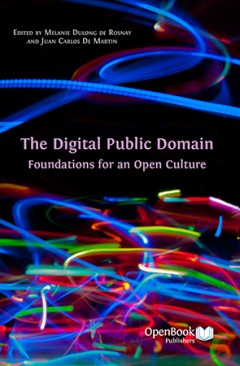
The digital public domain : foundations for an open culture
Digital technology has made culture more accessible than ever before. Texts, audio, pictures and video can easily be produced, disseminated, used and remixed using devices that are increasingly user-friendly and affordable. However, along with this technological democratization comes a paradoxical flipside: the norms regulating culture's use—copyright and related rights—have become increasi…
- Edition
- -
- ISBN/ISSN
- 9781906924768
- Collation
- xix. : 250 p.
- Series Title
- -
- Call Number
- 346.048 JUA t
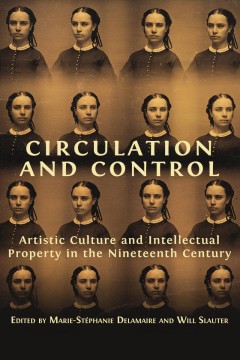
Circulation and control : artistic culture and intellectual property in the n…
The nineteenth century witnessed a series of revolutions in the production and circulation of images. From lithographs and engraved reproductions of paintings to daguerreotypes, stereoscopic views, and mass-produced sculptures, works of visual art became available in a wider range of media than ever before. But the circulation and reproduction of artworks also raised new questions about the leg…
- Edition
- -
- ISBN/ISSN
- 9781800641488
- Collation
- xiv, 288p.: ill.
- Series Title
- -
- Call Number
- 346 DEL c
 Computer Science, Information & General Works
Computer Science, Information & General Works  Philosophy & Psychology
Philosophy & Psychology  Religion
Religion  Social Sciences
Social Sciences  Language
Language  Pure Science
Pure Science  Applied Sciences
Applied Sciences  Art & Recreation
Art & Recreation  Literature
Literature  History & Geography
History & Geography